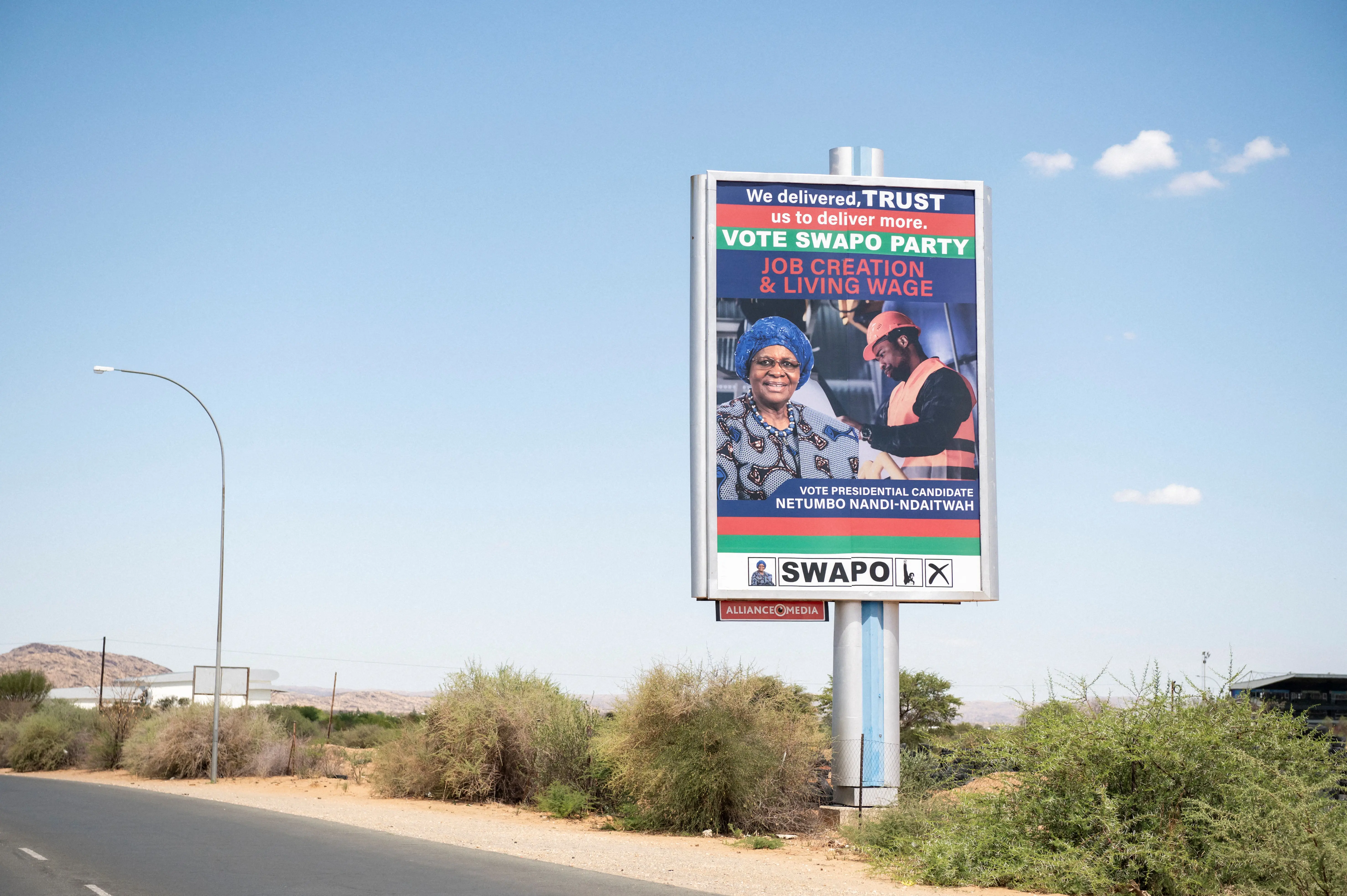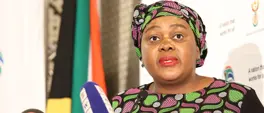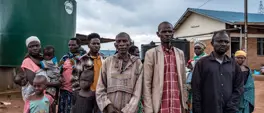MALAIKA MAHLATSI: Namibia’s president Nandi-Ndaitwah – a woman whose regressive politics belong in the dustbin of history
Malaika Mahlatsi
2 April 2025 | 9:16Having a woman president is an important step, but not when the woman takes women’s rights ten steps backwards. In that case, she is a complicit liability, writes Malaika Mahlatsi.
On the 35th anniversary of Namibia’s independence, Netumbo Nandi-Ndaitwa, was sworn in as the country’s first woman president.
There is no question that this is a key moment in Namibia’s, and indeed, Africa’s history. This is only the sixth time in history that an African country has been led by a woman president. The first was Liberia’s Ellen Johnson Sirleaf, who led the country from January 2006 until January 2018, serving two consecutive terms after winning both the 2005 and 2011 elections.
Between April 2012 and May 2014, the nation of Malawi was led by Africa’s second democratically elected woman president, Dr Joyce Banda.
In 2015, a year after Dr Banda’s crushing defeat in Malawi’s 2014 presidential election, the island nation of Mauritius would elect Africa’s third woman president. Professor Ameenah Gurib-Fakim was unanimously elected by the National Assembly following the resignation of President Kailash Purryag. She would resign just three years later after allegations of fraud and corruption following her use of a credit card provided by a non-governmental organisation founded by an Angolan banker who was seeking to conduct business with the Mauritian state.
The fourth woman to lead an African nation was Ethiopia’s Sahle-Work Zewde, who, like Gurib-Fakim, was also unanimously chosen by the National Parliamentary Assembly in October 2018. She would lead Ethiopia for six years until the end of her term in 2024.
This was a difficult time for the country as the Tigray War between the Ethiopian government and the Tigray People’s Liberation Front (TPLF) threatened to tear the country asunder. In March 2021, at the height of the COVID-19 pandemic, Dr Samia Suluhu Hassan was sworn in as the president of Tanzania following the death of President John Magufuli, who died while in office. Hassan is the only woman on this list who was not directly elected.
Six other women have served as interim or acting presidents during periods of transition. Two of them, Burundi’s Sylvia Kinigi and Gabon’s Rose Francine Rogombé, served as acting presidents following the deaths of sitting presidents. Kigini succeeded Melchior Ndadaye, who was assassinated in 1993, amidst a failed military coup after just three months in office.
Rogombé succeeded Omar Bongo, who died of a heart attack in June 2009. Catherine Samba-Panza led the Central African Republic in an acting capacity following the 2010 resignation of Michael Djotodia of the Séléka rebel coalition that had led a coup d’etat against then-president, François Bozizé.
The three other women on this list, Mauritius’ Agnès Monique Ohsan Bellepeau and South Africa’s Ivy Matsepe-Cassaburi and Angie Motshekga served briefly as acting presidents during periods of transition and in the absence of sitting presidents.
Bellepeau led the island nation of Mauritius from March to July 2012, and again from May to June 2015, during transitions of power. Matsepe-Cassaburi served briefly as acting president for four days in 2005 when both the president (Thabo Mbeki) and vice president (Jacob Zuma) were out of the country, and again for 14 hours in September 2008 during a transition of power following the resignation of Mbeki.
In July 2021, Motshekga served as the acting president when President Cyril Ramaphosa attended the funeral of Kenneth “KK” Kaunda, the first president of independent Zambia who played an instrumental role in South Africa’s struggle against apartheid.
Between 1993 and the present, 13 women have served as prime minister in various African countries. Five of these are currently serving in this position.
These include Togo’s Victoire Sidémého Dzidudu Dogbé Tomegah, who has been in the position since September 2020; Rose Christiane Ossouka Raponda, who has been Gabon’s prime minister since July 2020; Uganda’s Robinah Nabbanja, who has occupied the position since June 2021; Tunisia’s Najla Bouden Romdhane, who has been in the position since October 2021; and Saara Kuugongelwa-Amadhila, who has been the prime minister of Namibia since March 2015.

Since winning the November 2024 presidential elections for the Southwest Africa People’s Organisation (SWAPO), and following her inauguration, many have celebrated Nandi-Ndaitwah’s rise to power, arguing that it demonstrates that women are capable leaders.
There is no question that women are, in fact, capable leaders. Women have repeatedly demonstrated their ability to lead all kinds of institutions – including governments. But I am not convinced that the election of Nandi-Ndaitwah deserves celebration. Her politics belong to a time and place when the rights of women and other marginal communities were disregarded. It is an era that belongs in the dustbin of history.
Nandi-Ndaitwah is a conservative – and a deeply problematic one at that. She is opposed to women’s reproductive rights and stands firmly against the right to termination. This is not a small issue.
As women, and specifically, as feminists, we fight for the legalisation of termination because it is fundamentally a fight for our very lives. Restrictive laws on termination, which Nandi-Ndaitwah supports, drive women to seek termination in unsafe conditions, increasing the risk of complications and even death. Anti-termination laws also lead to a reduction in the availability of termination care, making it difficult for women to access safe and timely healthcare services.
The economic and social consequences of anti-termination laws and politics are also catastrophic for women. Women who seek or terminate face social stigma, discrimination, and denial of support from family and community. They are alienated, hurled into a zone of exclusion. Children pay the price when mothers are denied termination care.
The death of a mother due to unsafe termination can have a devastating impact on the well-being of children and other family members, particularly in a Namibia where the most recent census indicates that 65% of households are headed by single persons, 43.8% of which are women-headed.
The country’s Office of the Judiciary is dealing with thousands of maintenance cases in which women are seeking financial support for their children from absent and unwilling fathers. The death of a mother, in this context, has devastating consequences for the surviving children.
Furthermore, unwanted pregnancies lead to economic hardship for women, particularly those with limited resources or job opportunities. Namibia already has a persistent gender wage gap, with women working fewer hours in paid employment, influenced by two main factors - unpaid care work responsibilities and discriminatory practices in the labour market. In such a country, to hold anti-termination politics and support anti-termination laws is to condemn women.
Nandi-Ndaitwah is also fiercely opposed to the recognition of same-sex marriages. She led a faction within SWAPO that criticised a Supreme Court order passed in late 2024, which compelled the Namibian government to recognise same-sex marriages validly concluded outside the country.
This order followed the June 2024 ruling by Namibia’s High Court that declared colonial-era laws criminalising same-sex acts between men unconstitutional (which the state has gone on to appeal).
Nandi-Ndaitwah’s faction has characterised the fight for gay rights as a “homosexuality agenda”, leading to the further victimisation of Namibia’s significant LGBTIQ+ community.
Nandi-Ndaitwah’s politics are reflective of conservative Anglican values (in September 2024, the Anglican Church of Southern Africa voted against blessing or offering prayers for same-sex couples) and a regressiveness that should not have a place in an Africa that is transforming both demographically and politically.
Former liberation movements continue to be led by men and women of advanced age (like Nandi-Ndaitwah who will be 73 in October). This is depriving Africa of a new imagination and fresh ideas that can advance our civilisation.
Having a woman president is an important step, but not when the woman takes women’s rights ten steps backwards. In that case, she is a complicit liability.
Malaika is a geographer and researcher at the Institute for Pan African Thought and Conversation. She is a PhD in Geography candidate at the University of Bayreuth in Germany.
Trending News
More in Opinion

12 December 2025 15:34
CHARLES MATSEKE | The Republic of commissions arrives at its point of no return

12 December 2025 14:15
REBONE TAU | Ekurhuleni needs bold, decisive leaders to reverse years of capture

12 December 2025 05:13
MANDY WIENER | Searching for a superhero with a spine of steel: Why the position of NDPP matters so much











